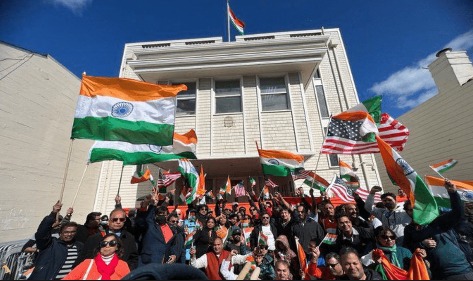
The United States has strongly condemned the vandalism and attempted arson carried out against the Indian Consulate in San Francisco, categorizing the violent acts as a “criminal offense.”
A video posted on Twitter by Khalistan supporters on July 2 depicted the arson attack. Additionally, sources indicate that the Indian Ministry of External Affairs (MEA) summoned the Canadian High Commissioner on July 4 due to Khalistan posters threatening Indian diplomats in Canada.
The video displayed the phrase “violence begets violence” alongside news articles concerning the recent death of Hardeep Singh Nijjar, the chief of the Canada-based Khalistan Tiger Force (KTF). Nijjar, who was one of India’s most-wanted terrorists with a cash reward of ₹10 lakh on his head, was shot and killed outside a gurdwara in Canada the previous month.
State Department spokesperson Matthew Miller tweeted on July 3, stating, “The U.S. strongly condemns the reported vandalism and attempted arson against the Indian Consulate in San Francisco on Saturday. Vandalism or violence against diplomatic facilities or foreign diplomats in the U.S. is a criminal offense.” Diya TV, a South Asian broadcast TV network in the U.S., confirmed the incident, reporting that a fire was set in the San Francisco Indian Consulate early Sunday morning, which was promptly extinguished by the San Francisco Department. The damage was limited, and no staff members were harmed. Authorities at the local, state, and federal levels have been notified.
Addressing the issue, External Affairs Minister S. Jaishankar expressed India’s request to partner countries like Canada, the U.S., the U.K., and Australia to refrain from providing space to the “extremist Khalistani ideology,” as it is detrimental to bilateral relations. He emphasized that the radical and extremist thinking of Khalistanis is not beneficial for any party involved. Minister Jaishankar confirmed that the Indian government will raise the matter of the posters with the respective governments of those countries.




